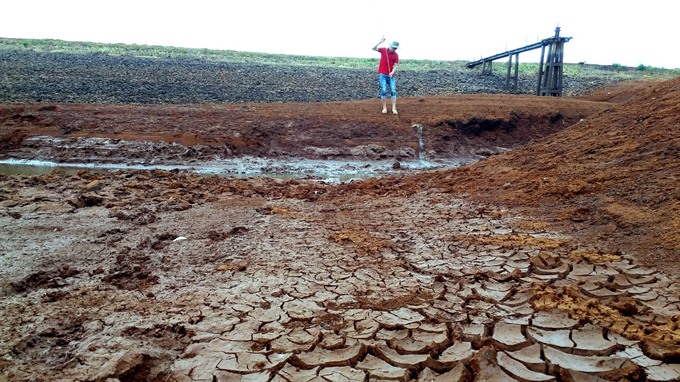 Society
Society

Deputy PM Phúc, Minister of Agriculture and Rural Development Cao Đức Phát and their entourage visited a 70ha rice field in Chư Dôn Commune, Chư Pưh District, which was badly damaged by the unprecedented drought.
 |
| A man stands at a reservoir dried out by the drought in Central Highland Gia Lai Province’s Ia Grai District. Deputy Prime Minister Nguyễn Xuân Phúc yesterday asked the local administration to provide water and food for people in drought-stricken areas.— VNA/VNS Photo Hoài Nam |
HÀ NỘI (VNS) — Deputy Prime Minister Nguyễn Xuân Phúc yesterday asked for sufficient food and safe water for drought-stricken regions as he looked into the ongoing drought in Chu Puh and Chu Se districts of Gia Lai Province.
Deputy PM Phúc urged local authorities and relevant agencies to pay attention to disease prevention, seek appropriate crops to replace lost rice fields and take prompt measures to support affected residents. He affirmed that in the long term, the Government will oversee ministries and localities as they invest in irrigation and safe water facilities. The State will also fund research for new irrigation methods.
The official also called for unity among people during this difficult time.
Deputy PM Phúc, Minister of Agriculture and Rural Development Cao Đức Phát and their entourage visited a 70ha rice field in Chư Dôn Commune, Chư Pưh District, which was badly damaged by the unprecedented drought. The village chief briefed the officials on villagers’ difficulties. Water sources for cultivation had been severely depleted and safe water was hard to come by.
Phúc said local residents could shift to other crops that can adapt more easily to harsh weather.
About 13,000ha of rice, crops and other plants in Gia Lai Province have faced a shortage of water since the middle of this month, leaving 15,000 households in the province hungry.
On the same day, the delegation met with leaders from the Central Highlands Steering Committee, Gia Lai Province and Central Highlands provinces to address the drought and find solutions.
The Ministry of Natural Resources and Environment provided maps of underground fresh water for all thirteen Mekong Delta localities, aiming to facilitate their search for fresh water resources.
The ministry also asked the Department of Water Resources Management and the National Centre for Water Resources Planning and Surveys to give technical and personnel support, as well as equipment to aid them in their search.
The provinces’ departments are required to focus on drilling wells to ensure a steady supply of water to the region’s residents, especially those living in areas hit hardest by water shortages.
The provinces of Vĩnh Long, Trà Vinh, Bến Tre, Kiên Giang, Long An, Tiền Giang, Sóc Trăng and Cà Mau received grants of VNĐ500 million (US$22,500) for the work.
The ministry is keeping a close eye on the development of El Nino and meteorological predictions to give advanced warnings about water flow in rivers and saltwater intrusion.
According to the National Centre for Hydro-meteorological Forecasting, El Nino will continue to cause negative impacts in Việt Nam until the middle of this year.
Average temperatures in the Mekong Delta in the remaining months of this year’s dry season will be 0.5 to 1.5 degrees Celsius higher than in previous years, with temperatures typically between 33 and 37 degrees Celsius. The rainy season is expected to arrive late, with average rainfall predicted to be 30 to 50 per cent lower than average.
The centre said saltwater intrusion has already reached alarming rates in Cà Mau, Kiên Giang, Bến Tre and Trà Vinh provinces. — VNS




